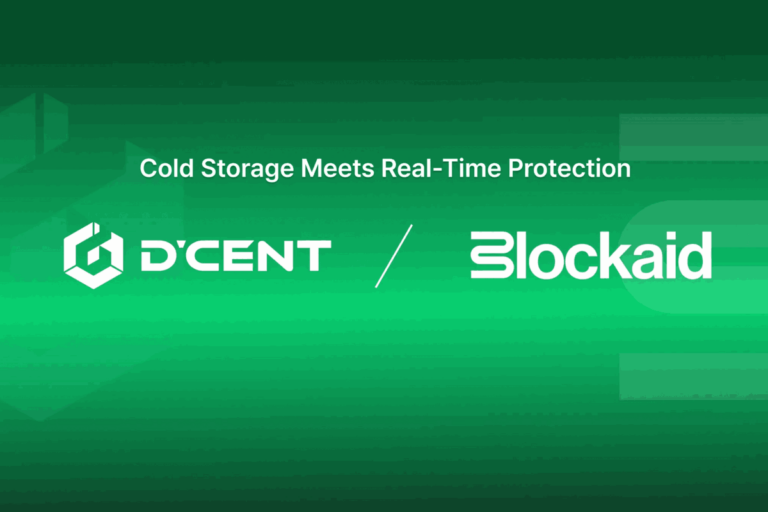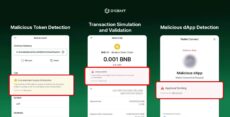D’CENT and Blockaid Partnership Brings a New Layer of Scam Protection to the Crypto Wallet

Crypto scams are rising, and it should not be the duty of only customers to keep their assets safe; developers must also do their part. That is the idea behind the latest D’CENT partnership.
The popular mobile-first cryptocurrency wallet has now partnered with Blockaid, offering another layer of protection. Before any transaction takes place, the wallet address will be assessed to provide an alert to users.
This approach removes much of the heavy lifting from the customer’s side, who often find themselves burdened by having to do “everything correctly”. D’CENT Wallet, with this new scam protection, secures them even before they sign up.
Security Beyond the Traditional Approach
It is not always the module’s fault that scams and malicious events happen. Sometimes, customers, not knowing how to proceed, end up embroiled in transactions that could lead to harmful effects.

To counter that, D’CENT Wallet has come up with a new solution. The new threat detection system starts to work before sign-up. Integrated directly into the D’CENT app, the new system assesses the addresses, the transactions, and the ecosystem for any suspicious patterns and behavior to provide precise alerts to users before they commit.
What Does D’CENT’s New System Protect Against?

“Everything” is the simplest description of the threats that D’CENT’s new system protects against. But if we were to give names to the things users will remain safe from, the following list is worth noting:
- Malicious Transactions: The crypto market moves fast, and fast moves often turn out to be desperate, as people are afraid they are leaving gains on the table. Understanding that, D’CENT braces itself by running a simulated transaction in the background and then giving either a clear or a warning about whether to move forward with the said transaction.
- Assessing the Tokens: Bad actors in the crypto space add hidden mechanics within a token’s smart contract that, when triggered, can do a lot of damage. It could be something as simple as not letting users sell the token, or something as big as theft of assets. D’CENT’s new threat detection system assesses tokens properly to confirm that they do not have any hidden, harmful logic integrated.
- dApp Detection: D’CENT’s new threat detection system also works on assessing decentralized applications. It analyzes the reputation of the project and its functionality. If there are any abnormal patterns, users get a warning.
One thing to know is that these threat protection systems don’t need to be assessed manually every time. D’CENT has turned it on by default, which means everything will happen automatically.
How Does D’CENT’s New Threat Detection System Work?
D’CENT has adopted a multiphased threat detection system that focuses on multiple factors.
Assessing the Transaction
When sending tokens, it analyzes the wallet address to try to match it against a global database of addresses associated with fraudulent transactions. If there are no issues, users don’t receive an alert.
Analyzing the Smart Contract
D’CENT assesses the smart contract’s behavior through simulation to see whether suspicious patterns emerge. If there are none, users get a go-ahead to complete the transaction.
Assessing the On-Chain Activity
D’CENT’s new system puts a sharp eye on each and every on-chain activity happening within a particular transaction instance. The goal is to find anything out of the norm and assess the degree of threat it represents.
“Your Wallet Should Be More than Just an Asset Storage Unit” – IoTrust CEO
IoTrust, the makers of D’CENT, firmly believe that a cryptocurrency wallet should provide a lot more value than just a storage space for tokens. That is why the focus of this project is on providing security as well.
“Security should not rely on users knowing how to read smart contracts or recognize red flags,” said Sang Su Baek, CEO of IoTrust. He further added that a wallet should protect users actively, and that is the reason behind D’CENT’s new security features.
About D’CENT
D’CENT’s unique proposition is that it is a hardware-first wallet developed by the South Korean security company IoTrust. The wallet’s “dual ecosystem” approach ensures security on both fronts: outside the internet and even inside it. Supporting over 85 chains and 4,000 cryptos, D’CENT offers all the core features via a single application, giving users much-needed convenience when interacting with the cryptocurrency market.
Disclaimer: This publication is sponsored. Coinspeaker does not endorse or assume responsibility for the content, accuracy, quality, advertising, products, or other materials on this web page. Readers are advised to conduct their own research before engaging with any company mentioned. Please note that the featured information is not intended as, and shall not be understood or construed as legal, tax, investment, financial, or other advice. Nothing contained on this web page constitutes a solicitation, recommendation, endorsement, or offer by Coinspeaker or any third party service provider to buy or sell any cryptoassets or other financial instruments. Crypto assets are a high-risk investment. You should consider whether you understand the possibility of losing money due to leverage. None of the material should be considered as investment advice. Coinspeaker shall not be held liable, directly or indirectly, for any damages or losses arising from the use or reliance on any content, goods, or services featured on this web page.